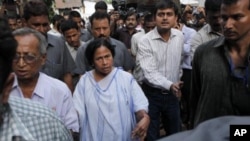The world's oldest democratically elected communist government is having what some are calling its Berlin Wall moment this week. In a vote expected to sweep the Communist Party decisively from power, voters in the Indian state of West Bengal are backing a tough, but sisterly opposition figure.
Trinamool Congress Party Chairwoman Mamata Banerjee had a quiet day at home in Kolkata, declining to make any public comment or prediction about the election landslide she is likely to enjoy as voting tallies are announced Friday.
After three weeks of multi-phased voting, exit polls suggest she and her hand-picked candidates are likely to sweep more than 200 of 294 parliamentary seats in the eastern Indian state of West Bengal.
The watershed vote is widely seen as seismic shift away from ideology and towards practical development.
Banerjee, known as "Didi," or big sister, to many here, was brutally beaten by Communist Party thugs nearly 20 years ago. Now, she says she will dismantle what she calls the "red ruin" of communist leadership, for which she blames West Bengal's decline. The state lags behind much of the rest of India on several economic indicators, and is deeply in debt.
Many voters say they are are fed up with the cronyism of the communist-led government, which has choked off employment opportunities.
A voter says all the best jobs are reserved for people with good connections to the Communist Party. If you are not in tight with the party, he says, you can not get a job. He adds, communist cadres behave like terrorists in society.
West Bengal's Muslims, too, appear to have reached a saturation point with politics as usual. Muslims make up about a third of the population - disproportionately higher than much of the rest of India. Muslim leader Aziz Mubaraki says the community feels it has been left out by the ruling communists.
"Being a Muslim, I can assure you that in my entire life I have never seen anything progressive for the community," he said. "We do not have a housing scheme, we do not have educational schemes, we have gone down drastically in government jobs. So, the Muslims have decided to change the government this time."
As a candidate, Banerjee has promised nothing short of a new golden age for Bengal. Make her Chief Minister, she says, and she will make parts of the state like "Switzerland." She says its capital, Kolkata, will become comparable to London in culture and wealth.
As a leader, she will confront one of India's biggest development challenges, the need for an orderly conversion of agricultural land into use for industry, energy production, and commercial development.
Trinamool Congress General Secretary Dinesh Trivedi says Banerjee will take a balanced approach.
"You want industry to develop, you want agriculture to develop," said Trivedi. "But the rule is very simple: Not one at the cost of the other."
Banerjee has led protests in recent years against what many saw as heavy-handed land acquisition by the state government. Her backing of farmers, especially as protests against a planned auto factory turned violent, is credited with swaying West Bengal's overwhelmingly rural population in her favor.
That support, along with an extraordinary security presence at the polls, may have tempered the inclination of Maoist insurgents to disrupt the three weeks of voting.
Supporters of West Bengal's communist-led Left Front say Banerjee is an untested leader who has done a much better job spelling out what she is against, than what she is for.
A senior Communist Party strategist in West Bengal, Gautam Deb, says Mamata Banerjee is likely to have a very different experience with her rural constituency when she actually comes to power.
"Whatever you have told the people, whatever slogans you gave, that will surely boomerang, and then she is facing the music as the real administrator," said Deb.
The Trinamool Congress has promised a blizzard of infrastructure investments, from roads to education and hospitals. The party aims to keep Bengal's young and talented from leaving the state for hubs like Bangalore, Hyderabad, and Mumbai.
The party is likely to turn to its ally, India's ruling Congress Party, for much of the funding to get those projects off the ground.




